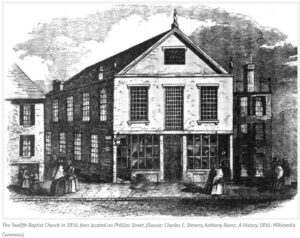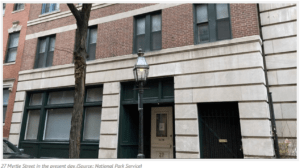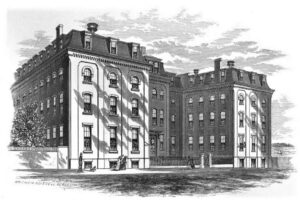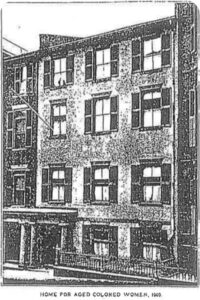History
Established in 1969, the Grimes King Foundation for the Elderly, Inc. is the successor in interest to the Home for Aged Colored Women, which was founded in 1860 and incorporated in 1864, under Chapter 80 of the Acts of the Commonwealth of Massachusetts of that year

1860 - 1899
BEGINNING A MOVEMENT

We were founded during America’s slavery era, by the multiracial group of bold abolitionists who created The Home for Aged Colored Women (HACW) in 1860. Our history begins when Rev. Leonard Grimes, who, after being released from prison in Virginia — for his involvement in the Underground Railroad — relocated to Boston as pastor of Twelfth Baptist Church. Rev. Grimes successfully partnered with Mrs. Rebecca Parker Clarke, a well-connected abolitionist and faith leader, and others to create a home to ease the suffering and indignities that poor, elderly African American/Black women experienced when they became too old to work.
Once multiple homes were opened, the HACW addressed the basic needs of thousands of these women, providing housing, food, health care, and financial aid for 84 years. In the 1950s and 60s, the supportive housing program models created by HAWC became the prototype for statewide, ‘integrated’, public housing for seniors. HACW’s Trustees also invested in two additional policy-changing initiatives, the Commonwealth Housing Foundation and the Ada Hinton Home in Roxbury.
- 1860: In April, the Home for Aged Colored Women was established at 65 Southac Street. For historic details please visit The MA Historical Society.
- 1864: In March, the Home for Aged Colored Women moved to 27 Myrtle Street where it stayed for 27 years
- 1872 – 1897: Mrs. Thurston, Mrs. Stallard, and Mrs. Rachel L. Smith served as its first matrons
- 1891: Home for Aged Colored Women moved to 22 Hancock Street in Boston’s Beacon Hill
Click here for our papers at the Mass. Historical Society
1920 - 1959
A NEW ERA OF CHANGE

In 1969, the Grimes-King Foundation for the Elderly, Inc. (GKF) was incorporated as a private foundation. Having already sold or transferred most of its properties, the proceeds from the sales of the remaining residences were used to provide grants to local area non-profit organizations and agencies serving elderly African American/Black women. GKF also committed to a sharper focus and deeper understanding of the public policies and economic strategies impacting this group. These strategic shifts resulted in profound system-wide changes for, as history shows, improvements made to services for elderly Black women, resulted in substantial benefits for all seniors.

- 1920: In November, the Committee on the Future of the Home included Ada Hinton, a member of the board from 1917 through 1968. They considered the alternative of using/providing outside aid. Ada Hinton’s vision was born.
- 1944: Having survived the Depression and uncertainty of the 1930s, the building housing the Home for Aged Colored Women, located at 22 Hancock Street for 45 years, was sold in July.
- 1945 – 1949: Regular Directors’ meetings were held during which the directors actively contemplated various programmatic and policy changes.
- 1949: In April, GKF’s then president, Ada Hinton, (informed by input from many others) implemented a programmatic shift. As a result, GKF’s activities shifted from residential housing to providing financial support of programs provided by community-based organizations. This redirection of resources and energy launched our still successful community-service grants program.
- 1951: On April 27th, The Commonwealth Housing Foundation, a “modern” housing project envisioned by a group of community minded Bostonians, was established and, with the active support of Ada Hinton, were given a $250,000 from the Home for Aged Colored Women’s General and Reserve Funds. This one action changed GKF’s future direction from just providing housing for indigent African American/Black women to collaborating with local area businesses providing support for them.
Click here for our papers at the Mass. Historical Society
1960 - 1964
MAKING SENIOR HOUSING HISTORY
- 1960: In the summer, the Commonwealth Housing Foundation’s project was completed. And this complex, located at 85 Dale Street, was named “The Ada Hinton Apartments”, providing both housing and various forms of social services for its elderly residents. The project was heralded, across the country, as a “unique and promising way to fund better housing for the elderly.”
- 1964: The Directors issued a large grant to St. Monica’s Nursing Home and supported a further programmatic shift by funding activities for seniors at the Roxbury YMCA from the the South End’s Robert Gould Shaw House.
1969 - Present
GRANT MAKING HISTORY
- 1969: In November, The Grimes-King Foundation for the Elderly was formally established, after significant changes to the organization’s mission were approved.
- 1970 – Present: Beginning in the 1970s, and through the present, a range of social service programs are supported through our now three annual grant programs – made possible by earnings from our endowment and grants from our strategic partners.
Please watch the video below to learn more about the history of the Grimes King Foundation
This video of the Grimes King Foundation for the Elderly, Inc was produced and donated by Lisa Simmons in 2019.

